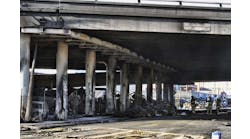UPDATE: The House of Representatives has released the text of the Moving Forward Act that calls for $1.5 trillion in infrastructure investments across a number of U.S. economic sectors, such as transportation, energy, education, housing, and healthcare, among others.
That legislation now also includes within it the INVEST in America Act surface transportation reauthorization bill recently advanced by the House Transportation & Infrastructure Committee, as previously reported.
Moving Forward Act Summary
A 96-page summary of the Moving Forward Act was released by House members, which breaks down, sector-by-sector, various infrastructure investments. Among the key items are:
- $494 billion in surface transportation reauthorization funding.
- $130 billion via the Reopen and Rebuild America’s Schools Act, targeting “high-poverty” school infrastructure needs.
- $100 billion for “affordable housing infrastructure” to create or preserve 1.8 million homes.
- $30 billion to upgrade hospitals to increase capacity, help community health centers respond to COVID-19, and prepare for future public health emergencies.
- $25 billion in the Drinking Water State Revolving Fund and other programs to ensure access clean drinking water and to help remove dangerous contaminants from local water systems.
- $25 billion to modernize U.S. Post Office infrastructure and operations, including building up a “zero emissions” postal vehicle fleet plus buying modern mail processing equipment and other goods.
Immediate concern was drawn to the Moving Forward Act as a non-bipartisan attempt to force through legislation that rolls back what some see as years of bipartisan work on the subject of infrastructure funding.
“With historic unemployment, tremendous unmet infrastructure needs, and less than four months before the expiration of surface transportation programs, this is no time for another partisan approach to infrastructure,” noted Neil Bradley, executive vice president and chief policy officer for the U.S. Chamber of Commerce, in a statement.
AASHTO Executive Director Jim Tymon pointed out that the Surface Transportation Advanced through Reform, Technology, & Efficient Review or STARTER Act introduced by the House T&I committee’s Republican Minority on June 17 “focuses on formula funding programs, streamlining project delivery and ensuring state flexibility – all principles adopted by the AASHTO Board of Directors.”
Earlier this month, the House Committee on Transportation and Infrastructure (T&I) released the Investing in a New Vision for the Environment and Surface Transportation in America (INVEST in America) Act, which has since made its way out of committee and to the House floor.
The $494 billion surface transportation package includes $105 billion for transit investments. A fact sheet released by the T&I Committee says the bill would:
- Increase funding for transit agencies to add new routes and provide more reliable service.
- Create a Mobility Innovation program to permit transit agencies to collaborate on mobility on demand services.
- Strengthen Buy America provisions to boost domestic jobs in rail and bus manufacturing.
- Increase investment in zero-emission buses to reduce carbon pollution.
- Streamline project delivery by reforming the Capital Investment Grants program so that investments get shovels in the ground quicker and commuters see results faster.
- Provide the investments needed to address the growing backlog of transit maintenance needs, making public transit safer and more reliable.
The legislation would also, according to the fact sheet, boost funding for highway safety programs under the National Highway Traffic Safety Administration, providing $5.3 billion over five years.
A section-by-section summary of the bill also outlines the bill's push for complete and context-sensitive street design. The summary says the bill revises roadway design standards to require consideration of all users of the transportation facility, including pedestrians, bicyclists, public transit users, children, older individuals, individuals with disabilities, motorists, and freight vehicles. It also instructs project sponsors to design in a manner that is tailored to the context of that facility, rather than a “one size fits all” approach.
--------
SOURCE: House T&I Committee



